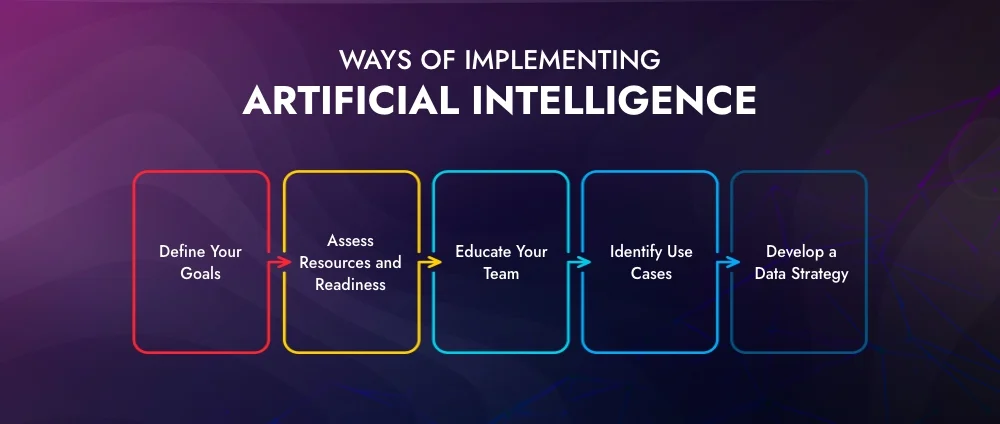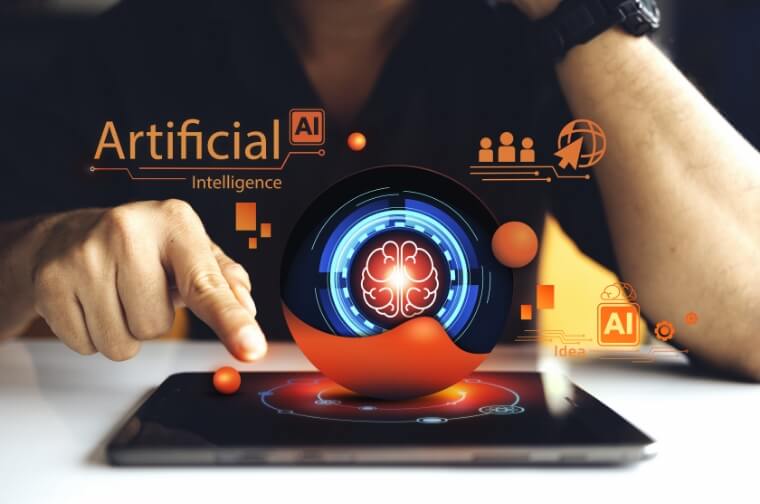Artificial Intelligence is a rapidly growing technology aiming to replicate human intelligence digitally. It helps computer devices receive inputs, understand them, and give solutions to problems like the human brain.
Various industries, from tech, health, and education to finance, are using AI technology to make impactful developments. The technology has the potential to contribute to tech, health, transport, and many other industrial applications, where humans may give inaccurate results and might be at life-threatening risk.
Here is a detailed overview of how AI works, as well as its concept, components, and applications. Walk through it to see how it will help you transform your business.
How does AI work?
According to Accenture predictions, AI will improve workforce efficiency and business profitability by 38% in the next 10 years, starting in 2024. Then What is AI? It is complex yet helpful for businesses. Then how does it work? To present it in simple words, it combines large datasets with various processing algorithms. Then, it learns the behavior patterns of datasets and manipulates algorithms.
You might be wrong if you consider AI to be based on a few algorithms. However, it is based on a machine-learning model. Let’s find out how AI works in the following steps:
Input
As with every other system or algorithm, input is the first step for AI. Here, the person handling AI for business operations needs to collect the necessary inputs to feed to AI to get proper output.
This input can be of any form, like text, video, image, voice, etc. However, whatever input the AI algorithm receives should be understandable. Further, you should also provide the expected output from the given input.
Processing
In the second step, AI starts processing input and decides to modify it according to the given output command. For this, AI interprets pre-programmed input data and identifies behavior patterns of data in real-time based on specific AI technology.
Data outputs
Once the AI technology completes data processing, it predicts data outputs. Then, it defines whether the output is valid or not.
Adjustments
If there is any mistake in data output, the technology can learn and correct results accordingly. In this step, it is possible to provide inputs to correct mistakes.
Assessments
After completing the assigned prompt, it is time to assess the output. In the assessment phase, AI can analyze the output data and make predictions. Further, it gives suggestions if you want to repeat the algorithm again.
What are the basic components of artificial intelligence?
AI can help businesses gain insights into daily operations that they can not understand easily. Furthermore, it can help businesses perform daily tasks quickly and efficiently. After knowing how does AI work, let’s go through the basic components of it. Here are a few important components of AI you should understand.
Learning
In AI, learning occurs when computer systems or machines memorize new data. Recent developments in machine learning allow enhancements in predictive and prescriptive analytics using operational data.
AI reasoning
Artificial intelligence has the ability to make inferences while applying command-based reasoning. Mainly, it uses inductive and deductive reasoning.
Problem-solving
AI is primarily used for its problem-solving and data manipulation ability. You can also use it for development purposes.
Perception
It is when a new sense organ, like artificial or real, scans the environment. Once an AI system receives elements of the environment, the perceiver will study various objects, collect their features, and identify relationships.
Language processing
Artificial intelligence will process language for autocorrects and spell checks. For this process, the system will use neural networks, scan large text bodies, and find issues like language irregularities and misspelled words.
Concepts of AI
Not every type of artificial intelligence is suitable for all businesses, datasets, and processes. Consider the following 4 main concepts of AI, and choose one that suits your business requirements.
Reactive machine
This AI concept can respond to real-time data. However, it has some restrictions, like the inability to build memory or store information.
Due to restrictions, you can’t use it to analyze data based on past experiences. However, it can be used to filter spam messages from inboxes or organize data from new clients.
Limited memory
This AI concept can store some data and use it to learn and use stored data to perform new tasks.
After processing information, it can study real-time data and make observations and predictions.
Theory of mind
It is a more advanced AI concept compared to limited memory. It can store data and make observations of real-time data.
However, it has not yet been fully developed. As the name suggests, it can respond to human behavior and emotions.
Self-aware
This advanced AI concept takes the theory of mind further. It processes information, saves it, and uses it while making decisions.
Along with its ability to store memory and understand human emotions, it can also make use of self-awareness while processing.
Ways of implementing AI
AI execution is an iterative process. It is crucial to adapt and reform your approach depending on your business requirements,
Although you will get significant advantages from AI tools, they also have some restrictions due to a lack of training data. Hence, humans should be responsible for decision-making and bringing creativity while implementing it. Here are a few steps on how you can use AI in your business.

Define your goals
Before using AI for your business operations, it is necessary to define business objectives and goals clearly. These aims should be important because they will give direction to your business output.
Setting clear goals keeps you focused while applying AI and helps stakeholders to understand what you want. With these goals, you can also measure the success and performance of AI application exercises.
Assess resources and readiness
Gauge your firm’s readiness for AI execution. The primary step is to ensure that you have all the required resources to adopt AI in your workflow,
Consider the data you have with the format, and see if it is enough to train the AI system. Since data quality reflects the accuracy of the ML model, make sure to feed filtered and accurate data.
Educate your team
For successful AI integration, You should understand technology fundamentals and educate your team. Alongside learning the basics of technology, learn about applications, AI concepts, machine learning, data science, deep learning, prompt engineering, etc.
Then, some practice of these processes should be done before exploring real projects. Further, restrict yourself and your team to one-time learning. It is a continuous process, so keep it constant.
Identify use cases
Recognize certain use cases of AI that can offer tangible benefits to businesses.
Further, explore areas where artificial intelligence can improve decision-making, efficiency, and client experience.
Develop a data strategy
During the assessment process, to see if your business is ready for AI, you must have enough data. It will help you train the AI model perfectly with precise and accurate data in enough quantity.
Therefore, a proper data strategy for data collection, storage, validation, and governance must be built. Hence, make sure to determine all the required data collection, storage, and cleaning steps.
Choose the right AI technologies and tools
Now, we know how does artificial intelligence works. Now, let’s see some right tools and technologies. There are thousands of AI tools and technologies in the market; for instance, you have Gemini, Midjourney, Adobe AI photo editor, AI image generator in Canva, etc. However, these technologies are more used in marketing.
These tools and technologies may not help your business. Then what to do? Don’t worry! ViitorCloud is here to help you with AI development services for your business. You can expect us to develop customized AI models that meet your business needs.
Ready to choose the right AI technologies and tools?
Our expert makes it easy to select the best options for your business.
Develop and train AI models
AI has been the fastest-growing industry recently. You can explore many AI tools or develop your own custom model. After exploring existing tools from the market, you may find that no tool is helping you. In this case, you can hire us for your AI development needs,
Once we develop the tool, you can start training it according to your requirements and available data. After completing training, start using the custom AI tool.
Pilot testing and evaluation
It is not good to put AI tools into production immediately after development. Instead, a series of trials in controlled conditions will be performed to check accuracy and performance. Gather feedback from pilot tests to make necessary improvements.
Once you collect audits from trials of developed AI models, make the required adjustments and modifications. After that, your AI tool will be ready for deployment.
Deploy and integrate
After going through all the above processes, you can finally use the developed AI model in production. Hence, integrate the model into your business workflows according to requirements; while deploying the tool, make sure to do it seamlessly by checking the compatibility.
Optimize and improve
Consistently track the performance of the AI solution and see if it is working properly. If it is not working as per your expectations, optimize technical adjustments and improve the performance of your solution.
Transform your business with AI
Adopting artificial intelligence is not an option; it is a dire need to thrive in this rapidly growing business era. Hence, businesses wanting to gain competitive advantage and sustainable growth must consider collaborating with AI development companies like Viitor Cloud and leveraging the full potential of this technology.
Whether you wish to develop a customized AI tool, chatbot, video solution, AI assistance, etc., for your business requirements, our advanced AI development services can help you achieve your goals very soon. Then, Why are you waiting? Partner with us now and mold your business in different dimensions.
Frequently asked questions
In learning, AI employs various algorithms to personalize content, study data, improve problem-solving ability, improve critical thinking, and share feedback. With adaptive learning, AI customizes learning experiences to individual requirements, fostering retention and deeper understanding.
In real life, artificial intelligence provides various benefits, like location tracking, image recognition, fraud detection, etc. By employing various AI algorithms, AI helps in task automation, making informed decisions, improving accuracy and efficiency, optimizing processes, etc.
Artificial Intelligence is not replacing any business. However, it is improving processes with data analysis and automation. Further, enhancing decision-making and efficiency gives businesses a competitive edge and sustainability.

Vishal Patel
Vishal Patel is an experienced Solution Consultant with a proven track record in the information technology and services industry.
